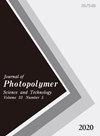方形光纤堆叠线性阵列的矩阵曝光光刻技术研究
IF 0.7
4区 化学
Q4 POLYMER SCIENCE
引用次数: 0
摘要
研究了端部为正方形的塑料光纤矩阵。这种光纤矩阵作为新型光刻工具与发光二极管相结合,特别需要用于打印二维代码标记。在跳汰器的长方形狭缝中填充大量直径为500µm的纤维,并在加热板上加热,同时将纤维端变形为方形。接下来,三个线性阵列,每个由10根纤维组成,简单地堆叠和结合,不涂任何粘合剂和/或不透明薄膜。预计从邻近的明亮纤维中漏出的光会降低印刷图案的质量。然而,当纤维末端通过1/10投影透镜投射到晶圆上时,通常不受相邻明亮纤维的影响而打印出格子图案。考虑到这些优点,我们在试验中制造了一个规则排列的10×10纤维基质,以证明开发基质曝光光刻系统所需基质的可用性。本文章由计算机程序翻译,如有差异,请以英文原文为准。
Investigations of Matrix-Exposure Lithography Using Stacked Linear Arrays of Squared Optical Fibers
Plastic optical fiber matrices with squared ends were investigated. Such fiber matrices are particularly required for printing two dimensional code marks by using them as new lithography tools combining with light emitting diodes. A large number of fibers with a diameter of 500 µm were packed in an oblong slit of a jig, and fiber ends were simultaneously transformed into square shapes by heating the jig on a hotplate. Next, three linear arrays, each composed of 10 fibers, were simply stacked and bound without coating any adhesives and/or opaque films. It was anticipated that light leaks from neighbored bright fibers degraded the printed pattern qualities. However, checker patterns were normally printed without influenced by neighbored bright fibers when the fiber ends were projected on a wafer through a 1/10 projection lens. Considering the advantages, a regularly arranged 10×10 fiber matrix was fabricated on trial for demonstrating the availability of the matrix required for developing a matrix-exposure lithography system.
求助全文
通过发布文献求助,成功后即可免费获取论文全文。
去求助
来源期刊
CiteScore
1.50
自引率
25.00%
发文量
0
审稿时长
4-8 weeks
期刊介绍:
Journal of Photopolymer Science and Technology is devoted to the publication of articles on the scientific progress and the technical development of photopolymers.

 求助内容:
求助内容: 应助结果提醒方式:
应助结果提醒方式:


